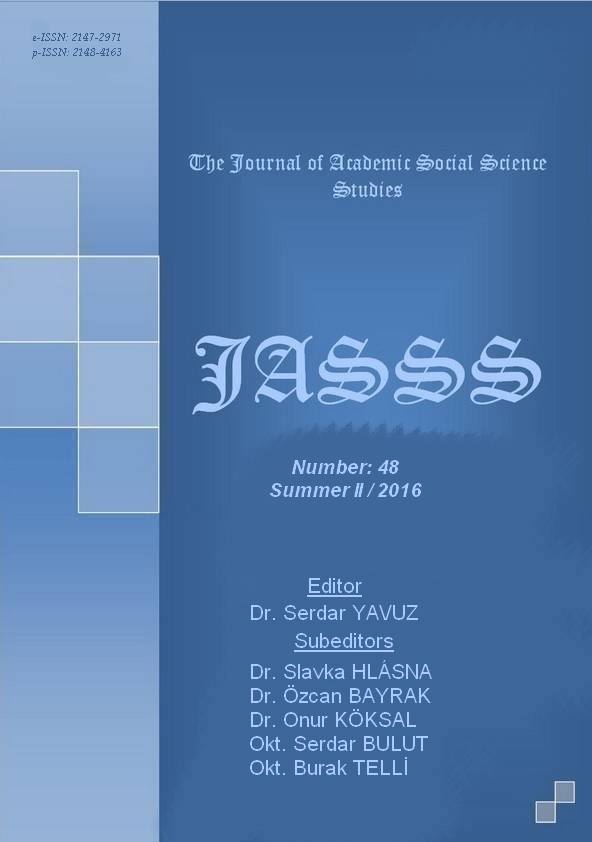Author :
Abstract
Kurtubî (ö. 671/1273), tefsir, hadis ve fıkıh âlimi olup Endülüs’ün başkenti Kurtuba’da doğmuştur. Kurtuba’da ilim tahsil edip buranın işgali (633/1236) sürecinde Mısır’a hicret etmiştir. Müfessirin yaşadığı çağda İslâm dünyası hem Doğu hem de Batı’dan kıskaca alınıp istilâ ve işgal edilmiştir. Bu gelişmeler sonucunda Mısır, Doğu’nun Moğollar; Batı’nın ise İspanyol Haçlı orduları tarafından işgal edildiği süreçlerde, ilim insanlarının sığındıkları bir ilim yuvası haline gelmiştir ki Bağdat ve Endülüs ilim merkezleri yerlerini Kahire ve Dımaşk’a bırakmıştır. Bu zaman dilimlerinde birçok ilmî, ictimaî, siyasî ve iktisadî olgu ve olaylara tanık olan Kurtubî ise Batı’yı Endülüs; Doğu’yu ise Mısır coğrafyasında özümseyip özgün birikimini el-Câmi‘ li-ahkâmi’l-Kur’ân adlı meşhur tefsirinde ortaya koymuştur ki bu husus yorumda yöntem ve yaklaşımlar açısından bizlere model oluşturabilir. Kur’an tefsirinde selef-i sâlihîn çizgisini izleyen müfessir yorum eyleminde rivayet ve dirayet metotlarını birlikte kullanıp akıl ve nakil olgularını kaynaştırmıştır. Kur’an’ı Kur’an’la tefsir edip ardı sıra sünnet, sahâbe ve tabiûn görüşlerini kaynak almıştır. Tefsirinin en belirgin niteliklerinden biri de ahkâm ağırlıklı olup o tüm ahkâm ayetlerinin tefsir ve te’vil edildiği biricik örneği temsil etmektedir. Kurtubî, Ahkâm tefsirinde mukayeseli hukuk anlayışına sahip olup mezhep taassubu gütmemiş ve makâsıdüş-şerîa prensibine dikkat çekip onun anlam ve önemini vurgulamıştır. Bu husus gerek onun ilmî ve ahlâkî şahsiyeti gerekse yaşadığı dönemin Endülüs hukuk tarihinin uzlaşmacı süreci içinde yer alması ile açıklanabilir. Kurtubî, İslâm hukukunun aslî ve fer‘î delillerini kaynak almış ve ahkâm âyetlerinin yorumunda istinbat ve ictihad mekanizmalarını işletmiştir. Kur’an tefsirinde amaçsal perspektif sergileyip Kur’an’ın maksatlarına ve şeriatın umumi maksat ve gayelerine özel bir önem atfetmiştir ki bu yaklaşım İslâm hukuk felsefesi açısından bizlere katkı sağlayıp yeni ufuklar açabilir. Söz konusu içeriğiyle el-Câmi‘ li-ahkâmi’l-Kur’ân, Endülüs tefsir kültürünün temel özelliklerini taşıyan eşsiz bir eserdir. el-Câmi‘ li-ahkâmi’l-Kur’ân örnekliğinde incelediğimiz gibi Endülüs müfessirleri de genellikle Kur’an’ın Arapça indirilişini önceleyip onu dil ve Kur’an’ın maksatları temelinde yorumlamışlar; mevzu rivayetleri ve Kur’an ve sünnetle uyuşmayan her türlü yanlış ve aşırı yorumları eleştirmişlerdir. Yorum eyleminin bu özelliklerle Batı’da ve Endülüs müfessirlerince gerçekleştir
Keywords
Abstract
Al-Qurtubi born in Qurtuba of Andalusia. His life of learning starts in Qurtuba and continues in Egypt where he immigrates to it, following the invasion of Qurtuba in 633/1236. Firstly our article deals with a very important figure of Andalusian exegetical school during the VII. İslamic century, al-Qurtubi and his most important work is al-Jâmi li-Ahkâm al-Qur’an. He has used the book as complementary methodology of al-tafseer bi’l-riwayah and al-tafseer bi’l-dirayah together. And examples are given from the book about how the Quran was interpreted with the aid of the Quran itself, of hadith the sayings of the Prophet’s Companions, and the sayings of tabiun. He also did not neglect to note the political, social and historical events of his time. Although al-Qurtubi belonged to the Maliki school of thought he never limited himself with Maliki law. He gave importance to the principle of maqâsid al-Sharîa and maslahah especially in ayât-al-ahkâm. al-Qurtubi’s philosophy of slâmîc law is an analytical study of Qurtubi’s concept of maslaha (business matter, important matter) in relation to his doctrine of maqâsid al-sharî’a with particular reference to the problem of adaptability / immutability of İslâmîc Legal theory to social change. The Andalusian Tafseer Culture appeared during the third century, developed in the fifth century, reach the peak by the commentaries of Ibn Atiyyah and al-Qurtubi. They showed general features Andalusian exegesis markedly. he makes use of weak (zayıf) hadiths as well as appocrifical (mevzû) traditions, we think that number of them is few. His approach to accepting traditions as authentic is not very critical but lenient. He more interested in the content than the process of transmission. He assembles hadiths for solvation of question raised by the verse which he interprets. All these data may provide to us important contributions in terms of interpretation methods and approaches. Al-Qurtubi travelled east and settled in Munya Abi al-Khusayb in upper Egypt, where he died in 671/1273.





